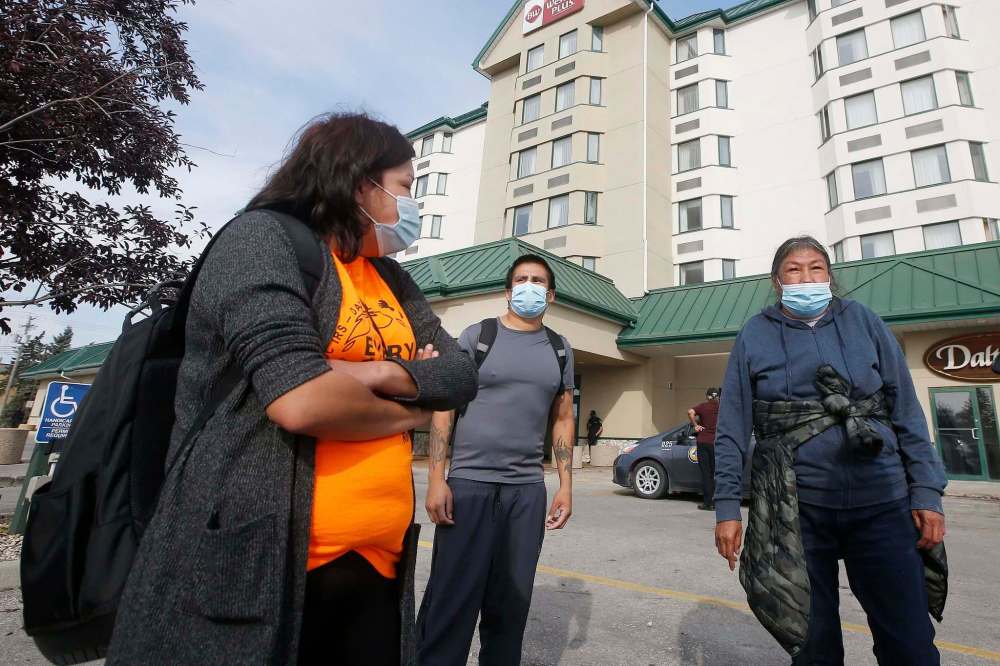First Nations members happy to head home
Advertisement
Read this article for free:
or
Already have an account? Log in here »
To continue reading, please subscribe:
Monthly Digital Subscription
$0 for the first 4 weeks*
- Enjoy unlimited reading on winnipegfreepress.com
- Read the E-Edition, our digital replica newspaper
- Access News Break, our award-winning app
- Play interactive puzzles
*No charge for 4 weeks then price increases to the regular rate of $19.00 plus GST every four weeks. Offer available to new and qualified returning subscribers only. Cancel any time.
Monthly Digital Subscription
$4.75/week*
- Enjoy unlimited reading on winnipegfreepress.com
- Read the E-Edition, our digital replica newspaper
- Access News Break, our award-winning app
- Play interactive puzzles
*Billed as $19 plus GST every four weeks. Cancel any time.
To continue reading, please subscribe:
Add Free Press access to your Brandon Sun subscription for only an additional
$1 for the first 4 weeks*
*Your next subscription payment will increase by $1.00 and you will be charged $16.99 plus GST for four weeks. After four weeks, your payment will increase to $23.99 plus GST every four weeks.
Read unlimited articles for free today:
or
Already have an account? Log in here »
Hey there, time traveller!
This article was published 04/10/2021 (1527 days ago), so information in it may no longer be current.
The nearing return home to Pauingassi and Little Grand Rapids First Nations won’t just cure homesickness — it will save lives, First Nation members say.
More than 1,500 people between the two northern communities are set to exit Winnipeg beginning today. They’ve been living in the city’s hotels since July, when forest fires triggered evacuations. Downed Hydro poles from the fires extended the stay.
Manitoba Hydro confirmed Saturday that power is restored.

“It’s not healthy coming out here,” said Sheldon Keeper, a 35-year-old Pauingassi First Nation member who stayed near the airport. “All of us need to go back home. It’ll be happier over there.”
There’s been violence, Keeper said — stabbings, fights. Gangs have targeted the First Nation group.
“Sometimes they think we’re in a gang, but we’re not,” he said.
He and his family have been deliberate with their clothing choices. Picking the wrong colour could be dangerous.
“I tried to dress (in) red before, but my mom told me not to,” Sheldon said.
Corey Keeper, Sheldon’s nephew, sported a blackened left eye Sunday — he’d gotten into a fight on the street.
Corey has lost three aunts to alcohol consumption since entering Winnipeg. “It’s hard to express,” he said of the losses.
Alcohol is much cheaper in the city than at home, Sheldon said.
“Out in Pauingassi, it’s like $160 a bottle to buy,” he said.
He and Corey were told they’d board a plane north next weekend. They’re hunters and eager to get back to it.
“That’s what we all miss,” said Priscilla Keeper, a Pauingassi First Nation member who isn’t related to Sheldon and Corey.
“First thing I’m gonna do is jump on a boat and… go hunt a moose,” she said.
She echoed Sheldon and Corey, saying her community needs to leave the city as soon as possible.
“I’m going to have a hard time hunting because (of) the fire,” Corey said, adding he’s unsure of the forest’s state.
Setting snares will be difficult and animals may have fled, Sheldon said.
Wildfires scorched approximately 800,000 hectares of land east of Lake Winnipeg, a provincial spokesperson said in August. Manitoba Hydro reported forest fires had damaged 91 poles and 35 structures servicing Little Grand Rapids and Pauingassi First Nations.
The outage led members of the northern communities to stay in Winnipeg hotels for months while evacuees of other First Nation communities, including Bloodvein and Berens River, returned home.
Samantha Bushie will leave for Little Grand Rapids Monday morning. Then, it’s back to work at the local school, teaching computer courses.
She and her mother stayed at a Best Western.
“It was good,” she said, adding she’s excited for a return to normal.
The Canadian Red Cross has been aiding evacuees, offering health supports, setting up hotels and meals, and offering hygiene kits and recreational activities, among other things.
“I can confirm that the Canadian Red Cross is already co-ordinating flights to the communities for the members in preparation for the return home process,” Michelle Palansky, a spokesperson for the organization, said in an email Sunday.
More details will come this week, she said.
Restoration took extra time because of difficult terrain, like poles mounted on rock outcrops, Manitoba Hydro said.
It had warned of potential delays in August, when it began restoration work.
The Assembly of Manitoba Chiefs and First Nations leaders had called for a state of emergency in hopes of faster restoration.
gabrielle.piche@winnipegfreepress.com

Gabby is a big fan of people, writing and learning. She graduated from Red River College’s Creative Communications program in the spring of 2020.
Our newsroom depends on a growing audience of readers to power our journalism. If you are not a paid reader, please consider becoming a subscriber.
Our newsroom depends on its audience of readers to power our journalism. Thank you for your support.
History
Updated on Monday, October 4, 2021 6:44 AM CDT: Adds photo





